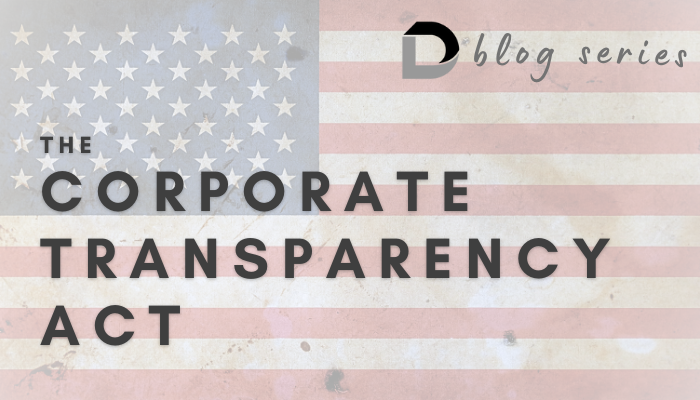Blog Series: What is the Corporate Transparency Act?

Posted on 10/02/2023 at 10:25 AM by Sierra McConnell
On January 1, 2024, the Corporate Transparency Act will require millions of U.S. companies to file first-time beneficial ownership information reports with the U.S. Department of Treasury Financial Crimes Enforcement Network. For the next several weeks, Dickinson Law will cover some of the most significant reporting obligations as well as what businesses, financial institutions, and existing entities need to know about the changes.
Have you heard the rumblings about the Corporate Transparency Act or the beneficial ownership information reports that will be required for almost every small business in the U.S.? It’s time to start listening because beginning January 1, 2024, your entity may be subject to new reporting obligations.
The Corporate Transparency Act (the “CTA”) passed on January 1, 2021 as part of the Anti-Money Laundering Act of 2020. The CTA authorized the Department of Treasury’s Financial Crimes Enforcement Network (“FinCEN”) to collect beneficial ownership information and disclose it to authorized government authorities and financial institutions to assist the federal government in pursuing financial crimes, subject to effective safeguards and controls.
FinCEN has been tasked with establishing and maintaining a national registry of beneficial owners of entities that are deemed reporting companies. To accomplish this, FinCEN finalized the CTA’s federal reporting requirements, known as the “Reporting Rule.”
Beginning January 1, 2024, reporting companies will be required to file beneficial ownership information (“BOI”) reports to FinCEN. Reports contain information about the entity itself and two categories of individuals: (1) beneficial owners and (2) company applicants.
A reporting company is broadly defined as a reporting company as any corporation, limited liability company, or other similar entity created by filing a document with the secretary of state or similar office in any state or territory or with a federally recognized Indian Tribe, or formed under the laws of a foreign country and registered to do business in the United States. Certain entities are exempt from reporting, including banks, credit unions, accounting firms, and large operating companies (think more than 20 full time employees and $5 million in gross receipts or sales).
If your company meets the definition of a reporting company and there is not an applicable exemption, then your entity will be required to file the BOI reports regarding beneficial owners and company applicants. In general, a beneficial owner is an individual who owns or controls at least 25 percent of a company or has substantial direct or indirect control over the company. Notably, the Reporting Rule does not include a limit on the number of beneficial owners that must be reported.
A company applicant is an individual who directly files or is primarily responsible for the filing of the document that creates or registers the company. A reporting company is only required to report their company applicants if the entity was formed on or after January 1, 2024, or if it is a foreign reporting company that was first registered to do business in the United States on or after January 1, 2024. Moreover, the Reporting Rule limits the number of company applicants to two individuals.
Navigating the definitions under the Reporting Rule may seem overwhelming but it is an important step in complying with this new law. However, depending on when your entity was formed, you may have some time to gather the required information. Entities formed prior to January 1, 2024 will have until January 1, 2025 to file their initial reports. Newly formed reporting companies will be required to file the BOI reports within 90 calendar days.
Categories: Sierra McConnell , Banking Law, Business Law
Questions, Contact us today.
The material, whether written or oral (including videos) that is posted on the various blogs of Dickinson Bradshaw is not intended, nor should it be construed or relied upon, as legal advice. The opinions expressed in the various blog posting are those of the individual author, they may not reflect the opinions of the firm. Your use of the Dickinson Bradshaw blog postings does NOT create an attorney-client relationship between you and Dickinson, Bradshaw, Fowler & Hagen, P.C. or any of its attorneys. If specific legal information is needed, please retain and consult with an attorney of your own selection.







